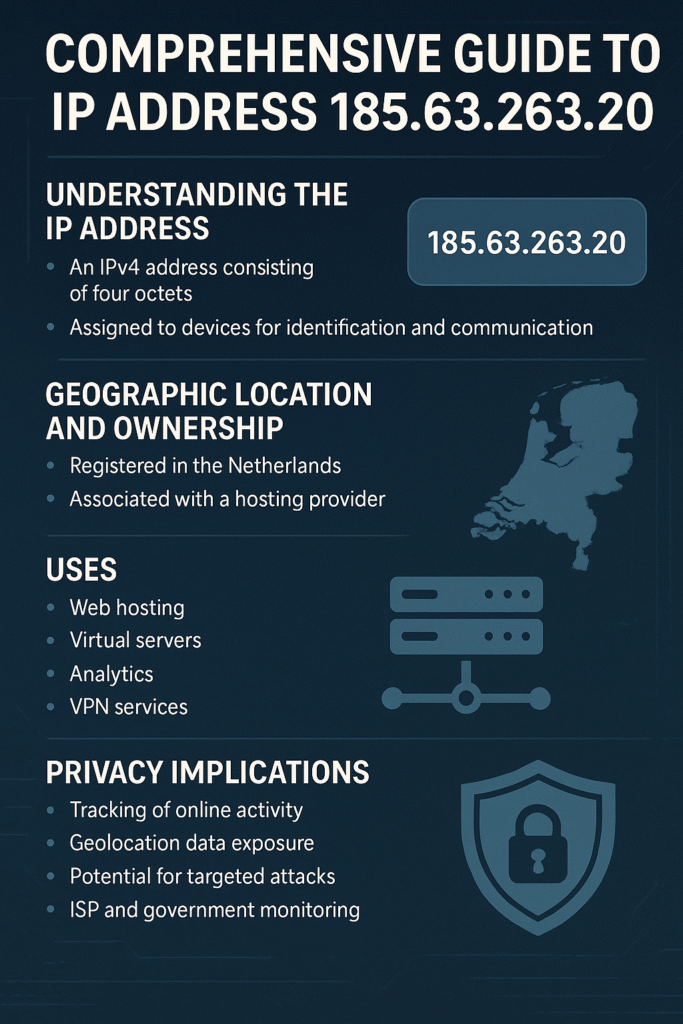Understanding the Anatomy of IP Address 185.63.263.20
An IP address functions as a unique digital identifier for devices on the internet, enabling seamless communication and data routing between users and servers globally. The IP address 185 63 263 20 belongs to the IPv4 protocol, characterized by four numerical octets separated by periods. Each octet ranges from 0 to 255, constructing a 32-bit address essential for network identification.
This specific IP address is part of a broader range commonly allocated to web hosting providers, which play a pivotal role in maintaining internet infrastructure. Unlike arbitrary numerical strings, each segment in 185.63.263.20 has a hierarchical meaning:
- The first octet (185) typically designates the broader network or regional registry.
- The subsequent octets (63, 263, 20) narrow down the address to a more specific subnet, and ultimately to a particular host within that subnet.
This structured format ensures accurate delivery of packets, supports routing protocols, and facilitates identification of devices across diverse networks.
Geographic and Ownership Profile of IP Address 185.63.263.20
The IP address 185.63.263.20 is registered to a hosting provider headquartered in the Netherlands, a country renowned for its advanced data infrastructure and stringent regulatory frameworks. This European location influences several aspects:
- Service Accessibility: Hosting services using this IP predominantly cater to European users, often delivering content optimized for local languages and legal compliance.
- Latency and Performance: Proximity to European data centers can reduce latency for users in that region, enhancing website loading speeds and user experience.
- Regulatory Oversight: Being within the EU jurisdiction means this IP’s activities are subject to GDPR and other privacy regulations, ensuring a higher standard of data protection.
Ownership records associate this IP with a company specializing in scalable web hosting solutions, cloud services, and virtual private servers (VPS). These providers typically offer high uptime guarantees and robust infrastructure, supporting numerous websites and online applications.
Primary Functions and Applications of IP Address 185.63.263.20
The utility of an IP address like 185.63.263.20 extends across several critical digital operations:
1. Web Hosting Services
This IP is primarily used to host websites, providing them with an address that allows browsers and clients to access web content reliably. Hosting providers assign such IPs to:
- Ensure stable uptime and accessibility.
- Manage domain name system (DNS) resolutions.
- Enable secure connections via SSL/TLS certificates.
2. Cloud and Virtual Server Operations
Enterprises leverage IP addresses in this range to provision virtual servers, scaling computing resources dynamically. These IPs facilitate:
- Remote server management.
- Data storage and backup.
- Application hosting and content delivery.
3. Data Analytics and User Tracking
Businesses use IP addresses to collect performance metrics and user behavior data. Through this, they can:
- Optimize website functionalities.
- Deliver personalized content.
- Monitor traffic patterns for security threats.
4. Cybersecurity Monitoring
Security teams track IP activity to identify anomalies, such as:
- Unauthorized access attempts.
- Distributed Denial of Service (DDoS) attacks.
- Botnet activity or spam origination.
5. VPN and Privacy Services
IPs similar to 185.63.263.20 are often employed by VPN providers to mask users’ true locations, granting:
- Enhanced privacy.
- Access to geo-restricted content.
- Protection against ISP tracking.
Privacy Implications Surrounding IP Address 185.63.263.20
Every IP address, including 185.63.263.20, exposes a digital footprint that can potentially compromise user privacy. Key privacy considerations include:
- Location Tracking: While an IP alone does not reveal exact user addresses, it can pinpoint general geographic areas.
- Browsing Behavior Exposure: Websites and advertisers can link IP addresses to online activities, constructing detailed user profiles.
- Risk of Targeted Attacks: Cybercriminals may exploit IP information to launch targeted phishing, malware distribution, or identity theft attempts.
- ISP and Government Surveillance: Internet service providers and government agencies may monitor IP traffic, often without explicit user consent.
Recognizing these privacy risks emphasizes the necessity for vigilant digital hygiene and proactive protective measures.
Strategies to Safeguard Your IP Address and Online Privacy
Securing your IP address and minimizing exposure requires a multifaceted approach:
Use of Virtual Private Networks (VPNs)
A VPN routes your internet traffic through encrypted tunnels, substituting your real IP with that of the VPN server, such as those potentially in the 185.63.x.x range. Benefits include:
- Concealing actual location.
- Encrypting data to prevent interception.
- Bypassing regional restrictions.
Deployment of Proxy Servers
Proxies serve as intermediaries, allowing indirect access to websites and masking your IP. They provide anonymity but typically lack VPN-grade encryption.
Regular Firmware Updates on Network Hardware
Updating routers and firewalls ensures vulnerabilities exploited by hackers are patched promptly, safeguarding IP-related data from breaches.
Careful Use of Public Wi-Fi Networks
Public networks often lack robust security, making IP addresses vulnerable. Employing VPNs and avoiding sensitive transactions on public Wi-Fi can prevent data exposure.
Privacy Settings and Browser Hygiene
Adjusting social media and browser privacy settings limits the inadvertent sharing of IP-related information and blocks trackers.
Recommended Diagram: IP Address Structure and Usage Flow
mermaidCopyEditgraph TD
A[User Device] -->|Request Data| B[ISP Router]
B -->|Assigns IP 185.63.263.20| C[Hosting Server]
C -->|Delivers Content| B
B -->|Forwards Content| A
subgraph Security Layer
D[VPN/Proxy Server] --> B
end
style A fill:#f9f,stroke:#333,stroke-width:2px
style B fill:#bbf,stroke:#333,stroke-width:2px
style C fill:#bfb,stroke:#333,stroke-width:2px
style D fill:#fbb,stroke:#333,stroke-width:2px
Conclusion: Mastery Over IP Address 185.63.263.20 and Internet Connectivity
Understanding IP address 185.63.263.20 extends far beyond mere numerical recognition. It embodies the essence of network communication, hosting infrastructure, and data routing within a critical European digital hub. This IP’s association with a reputable hosting provider ensures high-performance services tailored to a broad spectrum of online applications.
However, the privacy dimensions attached to any IP address necessitate deliberate protective actions. By integrating VPNs, proxies, and security-conscious habits, users and businesses alike can mitigate risks, safeguarding their digital identities.
In a world increasingly reliant on internet connectivity, mastery over IP address functionalities and associated privacy safeguards empowers stakeholders to harness the full potential of the web while maintaining control over personal and organizational security.

